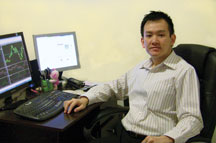INTERVIEW

“Trade small and grow your account gradually. Like any other profession, make sure you develop your skills. If you do this, opportunities will come to you.”
—Gavin Mok (pictured)
“Focus on being consistent. It doesnít matter what size you are trading. Put in the hard work and the consistency will come.”
—Kevin Haygreen
A Tale Of Two Traders
Two Traders, Two Methods
The idea of daytrading has captured the attention of many market enthusiasts, but it’s not an easy path to riches. It takes years to master, a tremendous amount of patience, and consistency in your results. But most important, each trader has a unique methodology that works for him or her. We interviewed Kevin Haygreen and Gavin Mok, both of whom came to daytrading and blogging about it from very different backgrounds, but they have in common a keen interest in the quick pace that the trading style affords. Britain-based Kevin Haygreen (not pictured) is a full-time home-based futures trader, while Gavin Mok lives in Melbourne, Australia, and trades currencies part-time from home. Kevin posts entries about his trades on his blog EMini S&P Trading (https://868347.blogspot.com), while Gavin writes about his trading at www.tradergav.com.
Stocks & Commodities Editor Jayanthi Gopalakrishnan interviewed the two daytraders in early April 2009 via email correspondence.
Kevin Haygreen
You canít keep a good man down
Kevin, tell us about yourself.
I am 24 and live in Leeds, in the United Kingdom. I’m a full-time trader, and nowadays I trade from home, but I used to be a prop trader. I started off trading European fixed-income markets, mainly the Bund and Schatz, but now I mostly trade the emini Standard & Poorís 500.
How did you get interested in trading?
This is where I sound very cliché. I was always interested in the financial markets, but a few things happened when I was younger that made me look seriously into the idea of being a trader. When I was 16, I was thrown out of home without a penny to my name, and after spending time homeless and living in shelters, I decided that I never wanted to ever be poor again, and to me trading seemed like a way to a better life.
I pulled myself out of that situation by working nights in a supermarket and at McDonald’s. I managed to get my own place, and I saved every penny I could. I sat and read everything about trading that I could get my hands on, via books and Internet forums. Once I started to develop a basic understanding of trading futures, trading started to become a passion for me, but at that point I still had never looked at a live chart.
What do you think helped you gain the confidence to trade your own account?
Time. I went through a phase of being afraid when I was trading. I think this was because I had a lot riding on it. I didn’t have any money, couldn’t afford to pay the rent or the bills, and the thought of losing money and digging myself into a deeper hole paralyzed my trading. Time was a great healer for me, but this is a personal journey that is different for every trader, and it is a journey that a trader has to complete on his or her own.
How did you learn to trade?
Once I saved up some money and my situation improved, I did some research on what I would actually need to start. Then I got myself some charts and a simulation account. At that point I had just started university and had a student loan and a part-time job. I spent as much time as I could just watching the markets, trying out the various methods that I read about.
At first I made the common mistake of trying to find the trading version of the Holy Grail by overloading my charts with indicators to find the perfect signal. As you can guess, this didn’t get me very far. During this time I compiled a list of every prop firm in the UK I could find, and I sent résumés out to every firm. Pretty much all the firms said no thanks, but I just kept sending them more résumés each time they said no.
One day I got a phone call from a firm asking me to go in and see them, so I put on my best suit and went down. They basically said to me that they didn’t have any positions as a trainee right then, but they were impressed with my dedication and they would consider me for the next year. I didn’t want to wait a year so I said I would work for free, so they gave me a shot. I left university to pursue my trading career.
As a trainee trader I was assigned a mentor, and a couple of other traders there took me under their wing, and that’s when I started to learn how to trade properly.